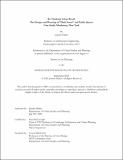Re-Thinking Urban Retail: The Design and Planning of “Dark Stores” and Public Spaces Case Study: Manhattan, New York
Author(s)
Halim, Juanita
DownloadThesis PDF (125.4Mb)
Advisor
Ben-Joseph, Eran
Terms of use
Metadata
Show full item recordAbstract
The retail industry has transformed into various formats due to the fast-paced social and sharing economy changes driven by technological advancements. The recent concept, grocery “dark stores” (retail facilities that are designed for online order fulfillment mostly located in urban areas), is expected to stay as e-commerce and omni-channel operators view them as cost-effective means of delivering quick services to customers. City officials are currently discussing the potential advantages and drawbacks of “dark stores” which could affect changes for street livability in the absence of retail storefronts. Should cities ban “dark stores” that compete with traditional brick-and-mortar retailers?
This thesis analyzes the proliferation of online grocery shopping and how “platform urbanism” (Sadowski, 2020), a novel set of digitally-enabled socio-technological assemblages rooted in the urban affects the spatial distribution of grocery “dark stores” activities by understanding their location and target customers. By using spatial analysis and interviews, this thesis tries to answer three questions: what is the role of grocery “dark stores” in cities?; where are they located?; and what are their impacts on the urban fabric? It uses NYC (Manhattan) 2021 decennial census and retail food stores data collected in 2022 and 2023 to provide some insights to these questions. The result shows that 1) The location of grocery “dark stores” are mostly located in neighborhood areas with high retail food stores and facility concentration 2) Grocery “dark stores” in Manhattan are located mostly in the Commercial and Manufacturing districts 3) Despite the rise of grocery “dark stores,” high funding from Venture Capitalists, and their promise of convenience to customers, in mid2022, grocery “dark stores” in Manhattan faced exits due to dwindling investor funding, competitive market landscape, and political environment driven by Russia-backed Venture Capitalists.
In the digital era, strategies to digitally transform the city need to consider the implications of different types of retail formats and stakeholders involved. There is a need for urban policy and regulation to address how new retail platforms can reshape the nexus between businesses location, their design and function and the public. As this thesis shows, there is more urgency to do so as new form of retail and businesses are emerging as a result the tech-enabled digital economy and urban new urban infrastructure.
Date issued
2023-09Department
Massachusetts Institute of Technology. Department of Urban Studies and PlanningPublisher
Massachusetts Institute of Technology